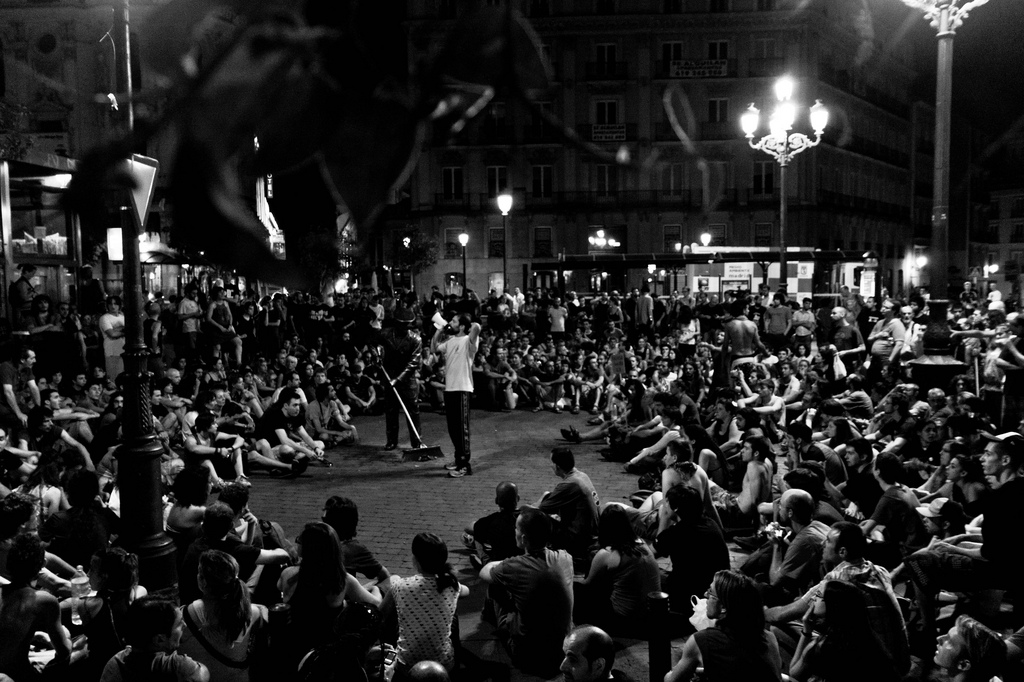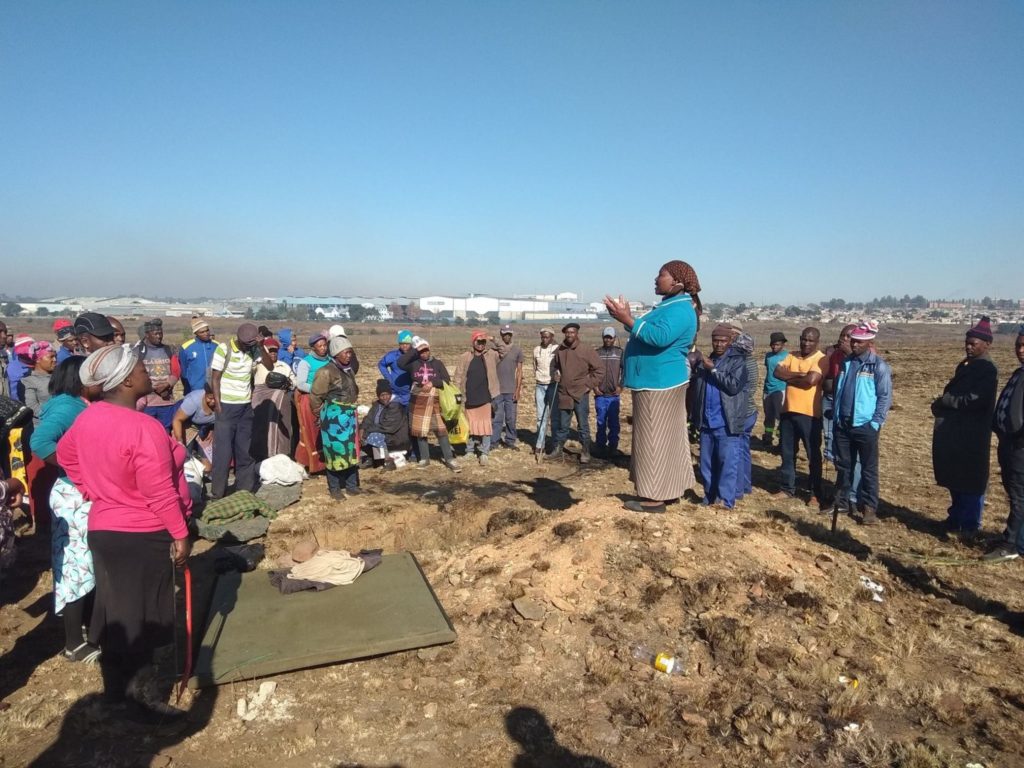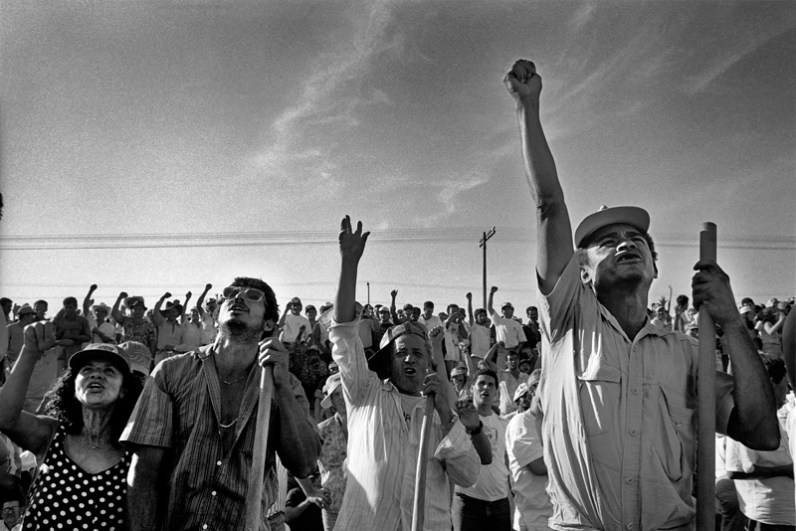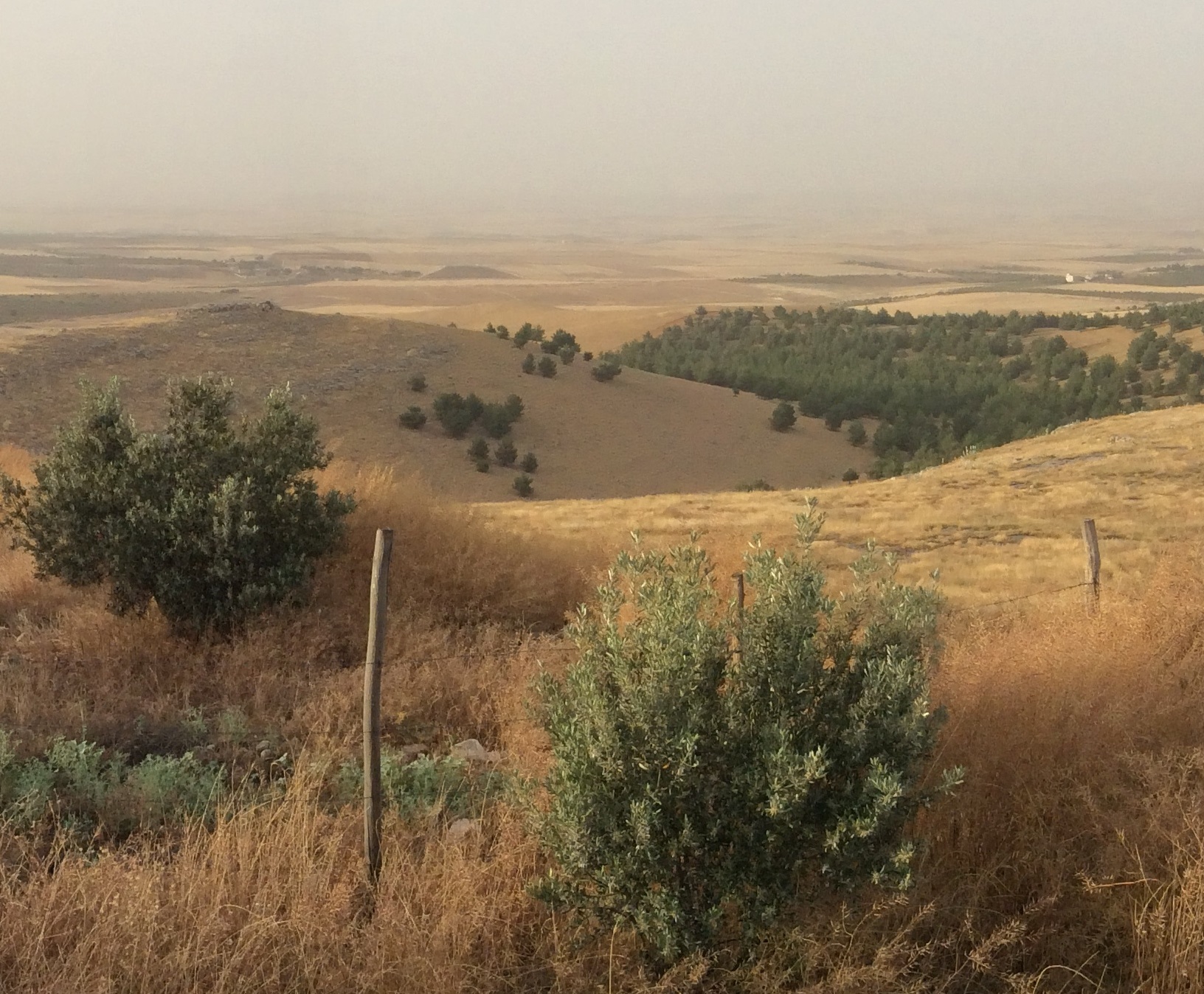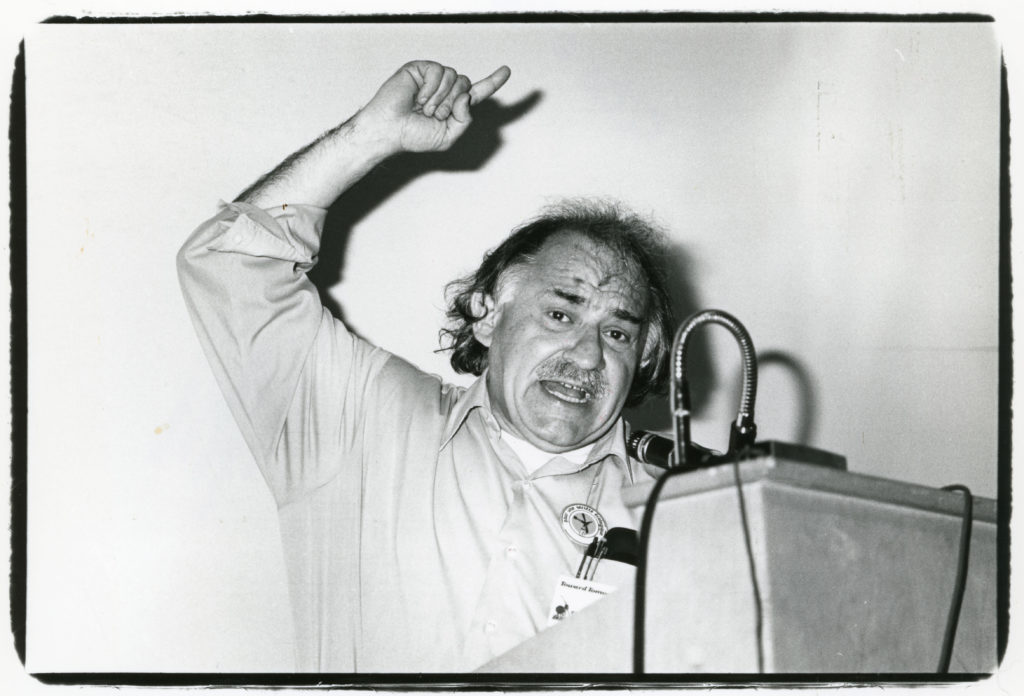
by Murray Bookchin
On August 24, 1978, Murray Bookchin gave a lecture at the Toward Tomorrow Fair in Amherst, Massachusetts. Also speaking at that year’s gathering were several prominent thinkers, including R. Buckminster Fuller and Ralph Nader. In his speech, Bookchin argues against the ideology of futurism and for ecological utopianism. In the Q&A session, he points out that he is not against technology itself, he is against technocracy, and he also describes, in detail, his political vision for the future.
The speech is surprisingly relevant in today’s context: it’s as if he predicted the rise of fascist ideology and lifeboat ethics in the 21st century, and it feels like a direct rebuttal of Elon Musk-esque technocratic futurism on both the right and the left.
Because his speech is so applicable today, we decided to republish it here, making it accessible to a wider audience. It has been transcribed and edited lightly for flow, brevity, and grammar, and we have divided it into sub-sections for ease of reading. The text is published with the permission of The Bookchin Trust.
This morning at eleven o’clock, I tried to explain to you why I was not an environmentalist, but rather was an ecologist. And I tried to give you some idea, at least from my point of view, what ecology meant, as distinguished from environmentalism. The point that I tried to make most fundamentally is that environmentalism tries to patch things up, applies band-aids, cosmetics, to the environment. It sort of takes hold of nature, strokes it, and says, ‘Produce!’ It tries to use soil, pour chemicals into it and if only they weren’t poisonous everything would be great. Whereas ecology believes in a genuine harmonization of humanity with nature. And that harmonization of humanity with nature depends fundamentally on the harmonization of human beings with each other. The attitude that we’ve had towards nature has always depended on the attitude we’ve had towards each other. Let’s not kid ourselves, there is no such thing as a ‘pure nature.’
The simple fact now is that I’m not only not an environmentalist, I’ve got some hot news—I’m not a futurist. I’m not a futurist at all. I’m a utopian. I want to see this word revived. I want to see us use it. I want to see us think utopian. Not think futurism. And it’s these questions that I’d like to talk about, if I may.
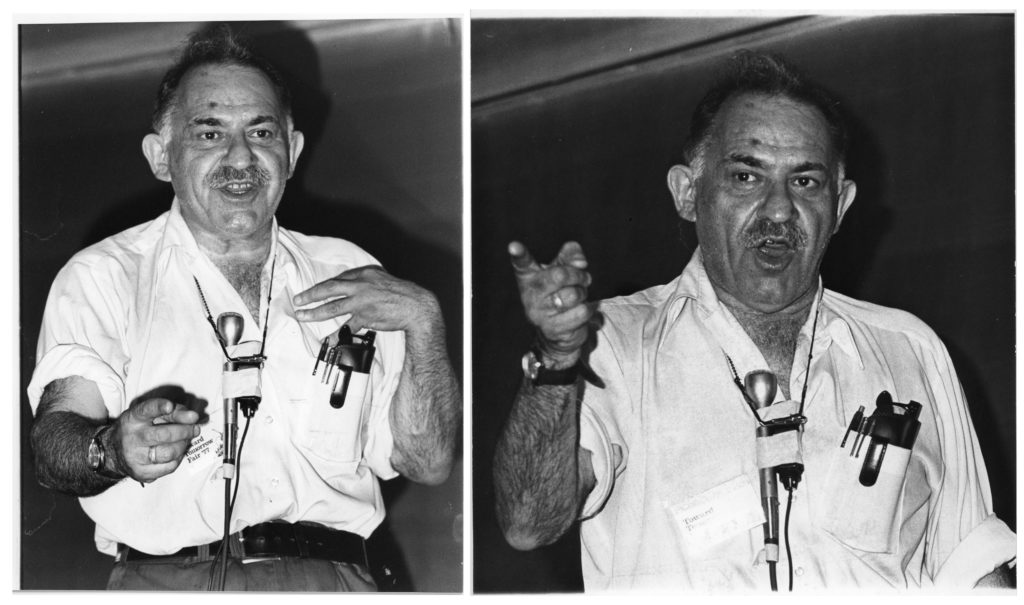
What is futurism?
What is futurism? Futurism is the present as it exists today, projected, one hundred years from now. That’s what futurism is. If you have a population of X billions of people, how are you going to have food, how are you going to do this… nothing has changed. All they do is they make everything either bigger, or they change the size—you’ll live in thirty story buildings, you’ll live in sixty-story buildings. Frank Lloyd Wright was going to build an office building that was one mile high. That was futurism.
The simple fact is, I just don’t believe that we have to extend the present into the future. We have to change the present so that the future looks very, very different from what it is today. This is a terribly important notion to convey. So a lot of people are walking around today who sound very idealistic. And what do they want to do? They want multinational corporations to become multi-cosmic corporations [laughter from the audience]—literally!
They want to bring them up in space, they want to colonize the Moon, they can’t wait to go to Jupiter, much less Mars. They’re all very busy, they’re coming around, they even have long hair and they even have beards, and they come around and they say ‘Oh, I can’t wait to get into my first space shuttle!’—that is the future.
This is regarded as ecology and it’s not ecology. It’s futurism! It’s what Exxon wants to do. It’s what Chase Manhattan wants to do. It’s what all the corporations want to do. But it is not utopia, it is pure futurism. It is the present extended into the future.
A mass society, and how do we keep in touch with each other? We don’t even have to look at each other. We’ll look at television screens. I’ll press a button, I’ll see you on the television screen, you’ll be on Mars, for all I know, and we’ll have a wonderful conversation with each other, and we’ll say ‘Gee whiz! We’ve got an alternate technology!’ The point is it isn’t a liberatory technology. I may know people in the future for years and years—play chess games with them, have interesting intellectual conversations with them—and never touch them once. If that is what the future is going to look like, I’m glad I’m fifty-seven years old and don’t have that much to go. I don’t want it. [laughter from audience] I am very serious.
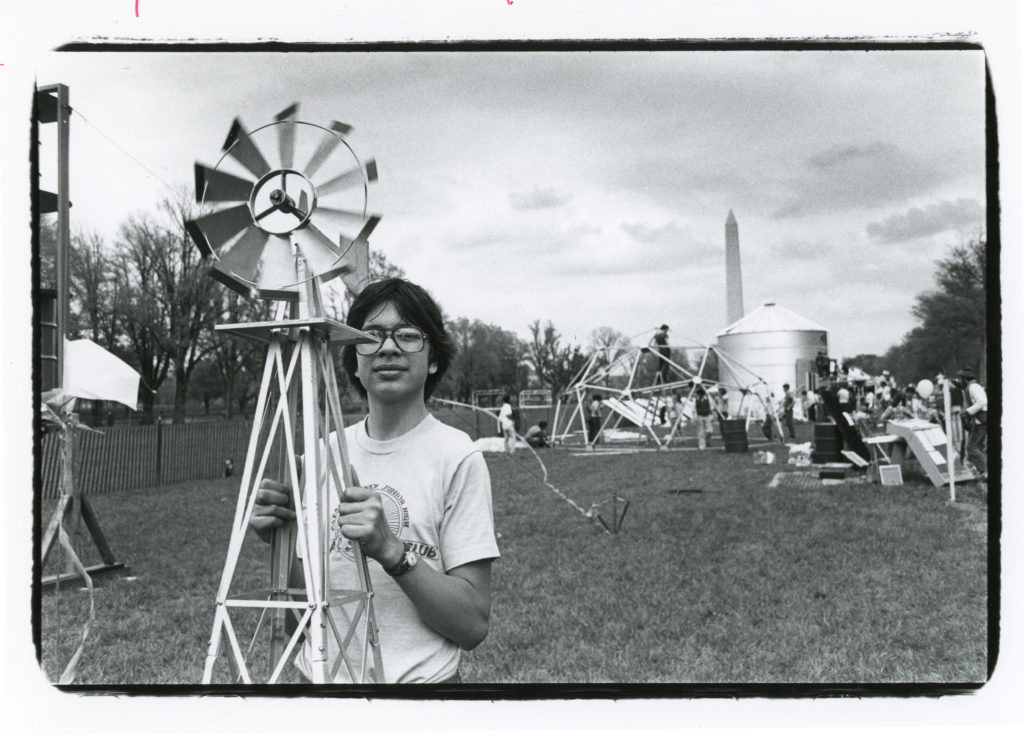
Now I’d like to touch a few nerves. I don’t believe that the Earth is a spaceship.1 I’m asking you to think about what it means to think of the Earth as a spaceship. It does not have valves. It does not have all kinds of radar equipment to guide it. It is not moved by rockets. It hasn’t got any plumbing. We may have plumbing. But it is not ‘a spaceship’. It’s an organic, living thing, to a very great extent, at least on its surface, built of inorganic material. It is in the process of growth and it is in the process of development. It is not ‘a spaceship’.
We’re beginning to develop a language which has nothing whatever in common with ecology. It has a lot to do with electronics. We talk of input. ‘Give me your input. Plug in!’ [laughter] Well, I don’t ‘plug in’, I discuss [applause]. Machines ‘plug in’. Radar is the language that produced it and the military is the language that produced the words ‘plug in’.
‘Give me your input’. That is not what I want. I don’t want your output, I want you. I want to hear your words. I want to hear your language. I’m not engaged in ‘feedback’ with you [laughter], I’m engaged in a dialogue, a discussion. It isn’t your ‘feedback’ I want, I want your opinion. I want to know what you think. I don’t want to have a circuit plugged into me where I can get your ‘feedback’ and you can get my ‘input’. [laughter]
Please, I’m making a plea here, and if you think I’m talking about language, I think you would be wrong. I’m not talking about language, I’m talking about sensibility. A plant does not have ‘input’ or ‘output’. It does something for which electronics has absolutely no language—it grows! It grows! [applause]. And let me tell you another thing, it not only grows, it does more than change; it develops. We have a big problem with all these words which reflect a way in which we think, and that’s what bothers me.
This is the sensibility of futurism. It is the language of futurism, in which people themselves are molecularized and then atomized and then finally reduced to subatomic particles, and what we really have in the way of an ecosystem is not growth, and not development, what we have is—plumbing. We run kilocalories through the ecosystem. And we turn on valves here and we turn off valves there.
Now, this may be useful, I don’t deny that. We should know how energy moves through an ecosystem. But that alone is not an ecosystem. We’re beginning to learn that plants have a life of their own and interact with each other. That there are subtle mechanisms which we cannot really understand. They can’t be reduced to energy, they can’t be reduced to kilocalories, we have to look at them from a different point of view. We have to view them as life, as distinguished from the non-living, and even that distinction is not so sharp and clear as many people think.
Most futurists start out with the idea, ‘you got a shopping mall, what do you do then?’ Well, the first question to be asked is, ‘why the hell do you have a shopping mall?’
So this is the language of futurism, and the language of electronics, which reflects a very distinct sensibility, that bothers me very, very, much. It is not utopian—and I’ll get to that afterwards—it is the language of manipulation. It is the language of mass society. Most futurists start out with the idea, ‘you got a shopping mall, what do you do then?’ Well, the first question to be asked is, ‘why the hell do you have a shopping mall?’ [laughter] That is the real question that has to be asked. Not ‘what if’ you have a shopping mall, then what do you do.
Out there in the great vast distance, which people feel we should colonize, moving out into spacecraft, or somehow relate to the distant universe and listen to the stars, but we haven’t even begun to listen to our own feelings. We haven’t even begun to listen to our own locality. This planet is going down in ruin, and people are talking about means of projecting space platforms out there, talking of a global village,2 when we don’t have villages anywhere on this planet to begin with. We don’t have them. We don’t have any villages, we don’t have any communities, we live in a state of atomization, and we expect to electronically communicate with each other through global villages. This bothers me because it may be good physics, it may be good mechanics, it may be good dynamics, it may be good anything you wish, but it is not ecology. It is not ecology.

What is ecology?
The most fundamental mistake begins with the idea that things change. Now, you know, to change may mean something or may mean nothing. If I step away here and walk three feet away, I have ‘undergone change’. I’ve moved three feet away, but I haven’t done a damn thing so far as I’m concerned, or so far as you are concerned. It is not ‘change’ that I’m concerned about. What I’m concerned about is development, growth. I don’t mean growth in the business sense, I mean growth of human potentiality, I mean growth of human spirit. I mean growth of human contact. That is ecological. To develop is what is really ecological. To change can mean anything. The question is, what is the end toward which you want to develop? What is the goal you’re trying to realize, and then, afterward, whether or not you have developed to that goal. So mere input and output and feedback, mere motion means nothing—the real problem is discussion and dialogue, recognition of personality, growth and development, which is what biology is concerned with. It is not concerned merely with change.
Lastly, it must be made very clear that if you believe that the Earth is a spaceship, then you believe that the world is a watch. You and Sir Isaac Newton agree perfectly, the world is a clock, just as a spaceship is a lot of plumbing with a lot of rockets, with a lot of dials, with a lot of pilots, and all the rest of that stuff. And if you believe in addition that the beauty, today, of change is that you can move all over the place in a helicopter, which will pick up your geodesic dome,3 or use some type of electronic communications to relate to somebody who is three thousand miles away, whom you may never see, then we are not changing, in the developmental sense, anything at all, we’re making things worse, and worse all the time. And that is a matter, also, of very great concern to me.
Ecology—social ecology—must begin with a love of place. There must be home. Oikos—home—ecology—the study of the household. If we do not have a household—and that household is not an organic, rich community—if we do not know the land we live on, if we do not understand its soil, if we do not understand the people we live with, if we cannot relate to them, then at that particular point we are really in a spaceship. We are really out in a void.
Ecology must begin with a very deep understanding of the interaction between people, and the interaction between people and the immediate ecosystem in which we live. Where you come from, what you love, what is the land that you love. I don’t mean the country or the state, I’m talking about the land that you may occupy. It may even be a village, it may be a city, it may be a farmstead.
But first and foremost, without those roots that place you in nature, and in a specific form of nature, it is a deception to talk about cosmic oneness, it is a deception to talk about spaceships, it is a deception even to talk about ecosystems without having this sense of unity with your immediate locale, with your soil, with your community, with your home. Without that community and without that sense of home, without that sense of the organic—of the organic and the developmental rather than the mere inorganic and ‘change’ in which you merely change place—you are changing nothing, the problems are merely amplified or diminished, but they remain the same problems.
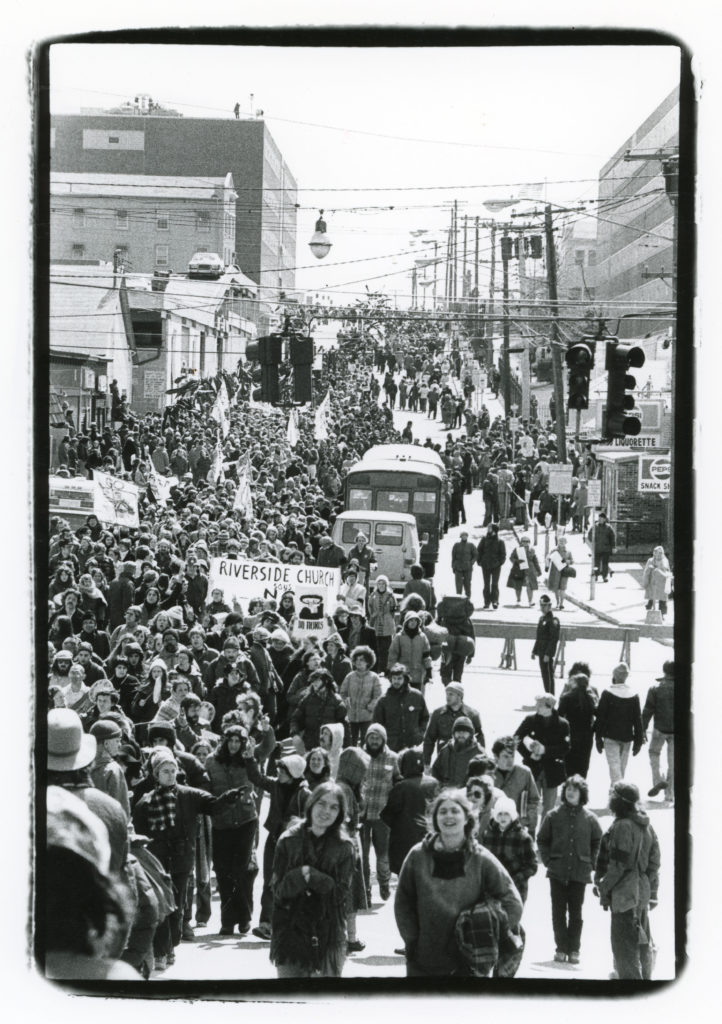
What isn’t ecology?
It is for this reason that futurism today plays an increasingly very very reactionary role, because it works with the prejudice that what you have is given. You have to assume what exists today, and you extrapolate into the future, and you play a numbers game. And then you go around and you logistically manipulate here and there, and implicit in all of this is the idea that you are things to be manipulated. There are all kinds of technicians who are going to decide through their knowledge of electronics, through their ‘know-how’, through their ‘feedback’ and their ‘input’, where you go, what you should do: and this is becoming a very serious problem today, particularly when it is mistaken for ecology, based on the organic, on the growing, on the development as an individual, as a community and as a place.
You then finally reach the most sinister numbers game of all: who should live and who should die. The ‘population game’. The terrifying lifeboat ethic, in which now in the name of ecology, today views are being proposed that are almost indistinguishable from German fascism.
There are those who are made to drown, they happen to live in India. Conveniently, they happen to have black or dark skin, and you can identify them. And then there are those who occupy another lifeboat, that lifeboat is called North America. And in that lifeboat, you have to conserve what you have, you see?
You have to be prepared to develop an ethic, you have to be prepared to develop the stamina to see people die. Of course you’ll regret it, but scarce resources and growing population, what can you do? You’re out there on the ocean, the ship is sinking, so instead of trying to find out what was wrong with the ship that makes it sink, and instead of trying to build a ship that will make it possible for all of us to share the world, you get into a lifeboat, just like you get into a spaceship, and at that particular point, the world be damned. And that is a very sinister ideology.
I speak as one who comes from the thirties, and remembers, very dramatically, that there was the demographic ecology, if you like, in Germany, no different from some of the demographic ecology I have been witnessing today.4 Remember well that the implications of some of these conceptions are extremely totalitarian, extremely un-ecological, extremely inorganic, and tend, if anything, to promote a totalitarian vision of the future in which there is no human scale, in which there is no human control.
Another thing that troubles me very deeply is the enormous extent to which social ecology or ecological problems are reduced simply to technological problems. That is ridiculous. It’s absurd. The factory is a place where people are controlled, whether they build solar collectors or not. It makes no difference. [Applause] The same relationships will exist there as under any other circumstances of domination exist. If ‘household’ means that women take care of the dishes, and men go out and do the manly work such as make war and clean up the planet, and reduce the population, where have we gone? Nothing has changed. What will a ‘spaceship’ on earth look like? What will it be? Who will be the general to give the orders, who will be the navigator to decide which way the ‘spaceship’ goes?
Please bear in mind what the implications of these things are. If people live in cities that are one mile high, how the hell can you get to know each other? How can you have a feeling for the land in which you live, when the landscape that you see goes up to a horizon twenty, thirty, forty miles away? On top of the World Trade Center, I have no feeling for New York. If I were just an ordinary, simple product of the United States Airforce, and I were ordered from the World Trade Center, way up there, to bomb Manhattan, looking down upon it, I would see nothing. I would press the button and it would be meaningless. Up would go the great bomb, the great flash, the great cloud. It wouldn’t have any meaning to me. Down on the ground, when I look up at the Empire State Building or the World Trade Center, I feel oppressed. I feel that I have been reduced to a lowly ant. I begin to feel the demand for an environment that I can control. That I can begin to understand. But when I see plants growing around me, when I see life existing around me—human life, animal life of all its different forms, flora—then I can relate. This is my land.
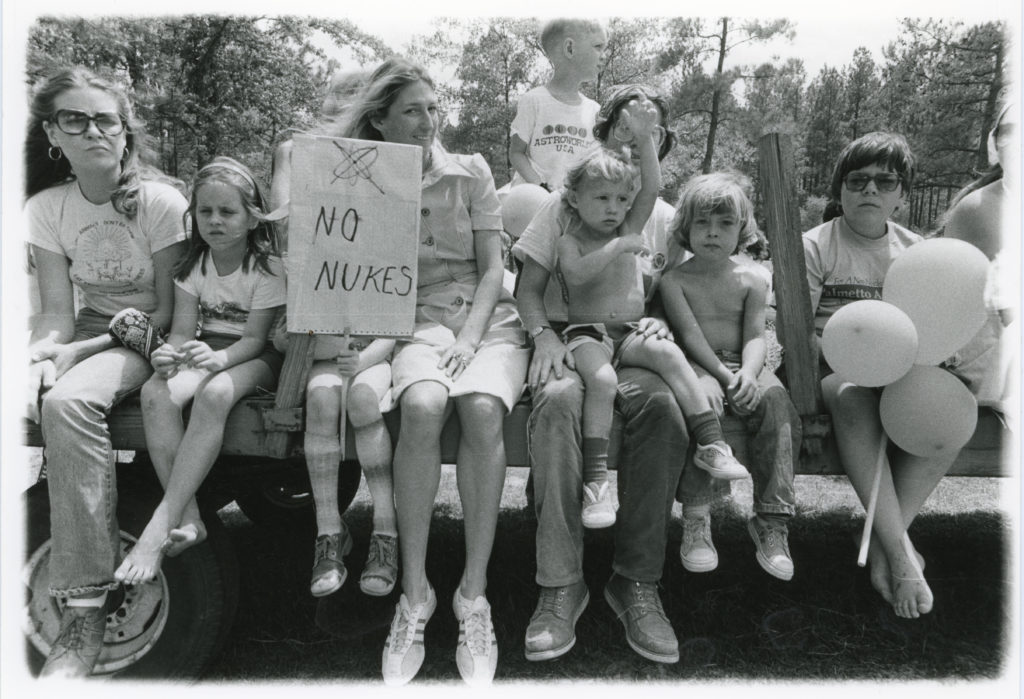
Think human
What we have to do is not only ‘think small’, we have to think human.5 Small is not enough. What is human is what counts, not just what is small. What is beautiful are people, what is beautiful is the ecosystems and their integrity in which we live. What is beautiful is the soil which we share with the rest of the world of life. And particularly that special bit of soil in which we feel we have some degree of stewardship. It is not only what is small that is beautiful, it is what is ecological that is beautiful, what is human that is beautiful.
What is important is not only that a technology is appropriate. As I have said before: the Atomic Energy Commission is absolutely convinced that nuclear power plants are appropriate technology—to the Atomic Energy Commission. The B1 bombers are very appropriate technology—to the Air Force.
What I am concerned with is, again, what is liberatory, what is ecological. We have to bring these value-charged words, and we have to bring these value-charged concepts into our thinking, or else we will become mere physicists, dealing with dead matter and dealing with people as though they are mere objects to be manipulated, in spaceships, or to be connected through various forms of electronic devices, or subject to world games, or finally, set adrift on a raft or a lifeboat in which they kick off anyone who threatens to eat their biscuits or threatens to drink their distilled water—and that becomes ecofascism. That becomes ecofascism, and it horrifies me to think that anything ecological—even that word ‘eco’—could be attached to fascism.
First and foremost, we must go back to the utopian tradition, in the richest sense of the word. Not to the electronic tradition, not to the tradition of NASA, not to the tradition of Sir Isaac Newton, in which the whole world was a machine or a watch.
You can travel all over the country and learn nothing, because you’re carrying something that’s very important with you, that will decide whether you learn or not, and that is: yourself. Move to California tomorrow, and if you’ve still got the same psychological and spiritual and intellectual problems, you’ll be sweating it out in San Francisco no differently than you do in Amherst or New York. That is the important thing—to recover yourself, to begin to create a community. And what kind of community imagination can begin to create.
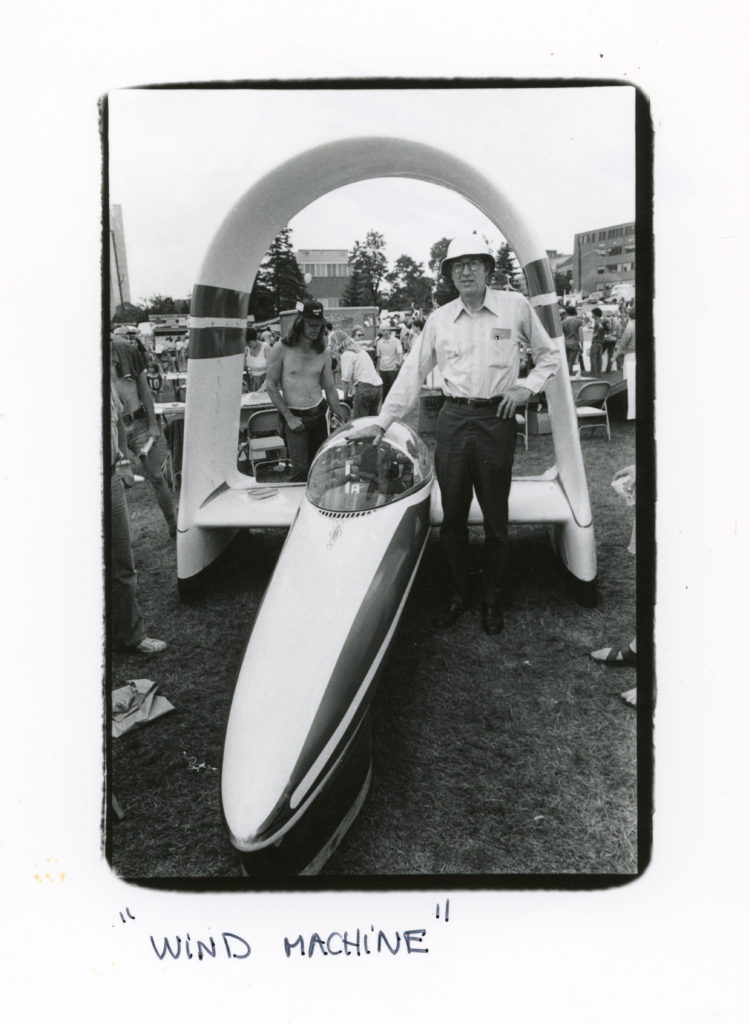
What does it mean to be utopian?
‘Imagination to power’, as the French students said. ‘Be practical, do the impossible’, because if you don’t do the impossible, as I’ve cried out over and over again, we’re going to wind up with the unthinkable—and that will be the destruction of the planet itself. So to do the impossible is the most rational and practical thing we can do. And that impossible is both in our own conviction and in our shared conviction with our brothers and sisters, to begin to try to create, or work toward a very distinct notion of what constitutes a finally truly liberated as well as ecological society. A utopian notion, not a futuristic notion.
It finally means this: that we have to begin to develop ecological communities. Not just an ecological society—ecological communities, made up of comparatively small numbers of groups, and beautiful communities spaced apart from each other so that you could almost walk to them, not merely have to get into a car and travel sixty or seventy miles to reach them. It means that we have to reopen the land and reuse it again to create organic garden beds, and learn how to develop a new agriculture in which we’ll all participate in the horticulture.
If you don’t do the impossible, we’re going to wind up with the unthinkable—and that will be the destruction of the planet itself.
We have to look into communities that we can take into a single view, as Aristotle said more than 2200 years ago—and we have yet to learn a great deal from the Greeks, despite all their shortcomings as slave-owners and as patriarchs—a community that we can take into a single view, so that we can know each other. Not a community in which we know each other not by virtue of sitting around and talking over the telephone, or listening to some honcho talk over a microphone, or listening to some bigger honcho talk over a television screen. It has to be done by sitting around in communities, in those town meetings, and in those structures which we have here in the United States as part of the legacy, at least—the best legacy of the United States—and start thinking utopian in the fullest sense of the word.
We have also to develop our own technologies. We can’t let other people simply build them for us. They can’t be transported from God knows where to us. We have to know how to fix our faucets, and create our own collectives. We have to become richly diversified human beings. We have to be capable of doing many different things. We have to be farmer-citizens and citizen-farmers. We have to recover the ideal that even a Ben Franklin—who by no means can be regarded, in my opinion anyway, as anything slightly more than a philistine—believed in the 18th century: you can both print and read, and when you printed, you read what you printed. That’s what we have to bring to ourselves. We have to think not in terms, merely, of change; we have to think in terms of growth. We have to use the language of ecology so that we can touch each other with the magic of words and communicate with each other, with the magic and the richness of concepts, not of catchphrases that are really snappy [snaps fingers]—’input’, ‘output’.’Dialogue’ is longer, but it has a beautiful ring to it. Dia logos, speech between two, talking between two. Logos—logic, reasoning out creatively, dialectically, and growing through conversation, and growing through communication. This is what I mean by utopia. We have to go back to Fourier, who said that measure of a society’s oppression could be determined by the way it treats its women. It was not Marx who said that, it was Charles Fourier…. We have to go back to the rich tradition of the New England town meeting, and all that was healthy in it and recover that and learn a new type of confederalism.
Today, the real movements of the future insofar as they are utopian in their outlook—insofar as they are trying to create not an extension of the present, but trying to create something that is truly new, that alone can rescue life, human spirit, as well as the ecology of this planet—must be built around a new, rich communication, not between leader and led—but between student and teacher, so that every student can eventually become a teacher, and not a dictator, a governor, a controller and a manipulator.
And above all, we have to think organically. We have to think organically—not electronically. We have to think in terms of life and biology, not in terms of watches and physics. We have to think in terms of what is human, not what is merely small or big, because that alone will be beautiful. Any society that seeks to create utopia will not only be a society that is free, it also has to be a society that is beautiful. There can no longer be any separation—any more than between mind and body—between art and the development of a free society. We must become artists now, not only ecologists, utopians. Not futurists, not environmentalists.
[applause]
Murray Bookchin was asked two relevant questions from the audience, which were inaudible in the recording. The first questioner asked if he was against technology.
Murray Bookchin: No, that is not at all true. I see a very great use for technology. What I’m talking about is a technocracy. What I’m talking about is rule by technicians. What I’m talking about is the use of various types of technological devices that are inhuman to people and inhuman in their scale, and cannot be controlled by people. The beauty of an ecological technology—an ecotechnology, or a liberatory technology, or an alternative technology—is that people can understand it if they are willing to try to devote some degree of effort to doing so. It’s simplicity, wherever possible, it’s small-scale, wherever possible. That’s what I’m talking about. I’m not talking about going back to the paleolithic, I’m not talking about going back into caves. We cannot go back to that and I don’t think we want to go back to that.
In the next question from the audience, Bookchin is asked to, very concretely, describe his political vision. There is laughter after the question.
I’m going to be really hard rocks about this and get down to it and not just tell you that I’m giving you some vague philosophical principles. I would like to see communities, food cooperatives, affinity groups, all these types of structures—town meetings developed all over the United States. I’d like to see neighborhood organizations, non-hierarchical in their form, developed all over the United States, from New York City to San Francisco, from rural Vermont to urban California. When these particular organizations develop rapidly and confederate, at first regionally, and hopefully, nationally, and perhaps even internationally—because we are no longer talking about the United States alone, we’re even talking about what’s going on in the Soviet Union to a very great extent—I hope they will then, through one way or another, by example and through education win the majority of people to this sensibility. And having done this, demand that society be changed, and then afterward we’ll have to face whatever we have to face. The only alternative we have after that, if we don’t do that, will be as follows: we will be organized into bureaucracies, bureaucracies in the name of progress, as well as bureaucracies in the name of reaction, as well as bureaucracies in the name of the status quo. And if we’re organized in the form of these bureaucracies, whether we use solar power or nerve gas, it makes no difference, we’re going to wind up, ultimately, with the same thing. In fact, the idea that solar power or wind power or methane is today being used instead of fossil fuels, will merely become an excuse for maintaining the same multinational, corporate, and hierarchical system that we have today.
So I propose that those types of organizations, and those types of social forms, be developed all over the country, and increasingly hopefully affect the majority of opinion, to a point where the American people, in one way or another, make their voices heard, because they are the overwhelming majority, and say they want to change the society. And if America turns over, the whole world will change, in my personal opinion. Because this happens to be the center, literally the keystone of what I would call the whole capitalistic system that today envelops the world, whether it be China, Cuba and Russia, or whether it be the United States, Canada and Western Europe. That is, very concretely, what I propose.
Daydreams are dangerous. They are pieces of imagination, they are bits of poetry. They are the balloons that fly up in history.
I’d like to make this very clear, the American people first will begin to change unconsciously, before they change consciously. You’ll go around to them and you’ll say, what do you think of work? And they’ll say it’s noble. You’ll ask them what do you think of property? And they’ll say it’s sacred. And you’ll ask them, what do they think of motherhood, they’ll say it’s grand, it’s godly. What do you think of religion and they’ll say they belong to it and they are completely devoted to it. You’ll ask them, what do they think of America, and they’ll say, either love it or leave it. You’ll say, what do you think of the flag and they’ll say it’s glorious, Old Glory.
But then one day something is going to happen. One day, the unconscious, the expectation, the dream, the imagination, the hope that you go to bed with as you sink into the twilight hours of sleep, or the early morning when you daydream, just after the alarm clock has gone off and you’ve shut it down—those expectations and dreams that lie buried in the unconscious mind of millions upon millions of American people are going to break right into consciousness. And when they break right into consciousness, heaven help this society. [audience cheers] I’m very serious.
That is the strange catalysis, the strange process of education; everyone today is schizophrenic, we’re all leading double lives, and we know it. And not only are we leading double lives, those ordinary—so-called ‘ordinary’—people out there are also leading double lives. And one day, that double life is going to become one life. Maybe it’ll be for the worse. But maybe it’ll be for the better. At that particular point, maybe something like May, June 1968 in Paris will start. All over the place, all kinds of flags will go up that don’t look like the flag we’re accustomed to seeing. [laughter from audience] Maybe black or red, I don’t know. At that particular point, millions of people will stop working, and they’ll start discussing.
Then you’ll have that terrifying situation called mob rule. But that will happen, and that’s what happened here in 1776, they believed in the King, right up until July 1776. In the meantime, they were having doubts. They didn’t even know they didn’t like the monarchy. But one day they woke up and said, the hell with King George. And they ran ahead, and they wrote the Declaration of Independence, and it was read to the troops. At that particular point, the Union Jack went down and the Stars and Stripes went up. This is the way people actually change. People change unconsciously before they change consciously. They begin to float dreams—daydreams are dangerous. Daydreams are pieces of imagination, they are bits of poetry. They are the balloons that fly up in history.
Transcribed and edited by Constanze Huther.
Murray Bookchin was a political theorist, philosopher, and activist. He developed the philosophy of social ecology and the political theory of libertarian municipalism, or communalism, which has influenced the growing ‘municipalist’ movement around the world. He was the co-founder of the Institute for Social Ecology, which is still active today. Bookchin died in 2006. The full audio version of this speech is available from the University of Massachusetts Special Collections and University Archives here.
This text is ©2019 and published with the permission of The Bookchin Trust. For permission requests contact: bookchindebbie@gmail.com.
All photos are by Lionel Delevingne, taken between 1975-1978, reprinted with permission from the Lionel Delevingne Photograph Collection at UMass Amherst. Thank you to Eleanor Finley for obtaining the scans.
